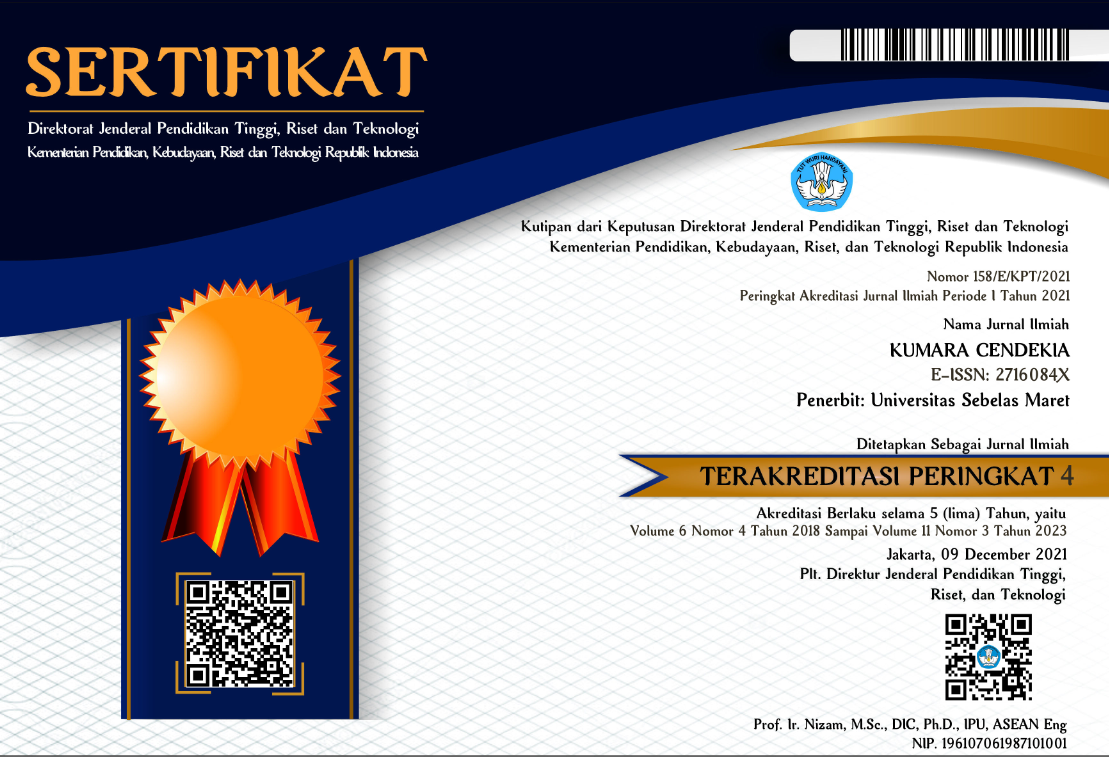Hubungan Pemahaman Bahasa Matematika dengan Keterampilan Matematika Spesifik Anak Usia 5-6 Tahun
Abstract
Keywords
Full Text:
PDFReferences
Arikunto, Suharsimi. (2012). Prosedur Penelitian Suatu Pendekatan Praktek. Jakarta: Rineka Cipta Clements DH, Sarama J. (2010). Learning Trajectories in Early Mathematics – Sequences of Acquisition and Teaching. In: Trembly RE, Boivin M, Peters RDeV, eds. Bisanz J, topiced. Encyclopedia on Early Childhood Development Hornburg, C. B., Schmitt, S. A., & Purpura, D. J. (2018). Relations between preschoolers’ mathematical language understanding and specific numeracy skills. Journal of Experimental Child Psychology, 176, 84–100. Jalal, F. Karnadi. Laily, A. 2019. Peningkatan Kemampuan onsep Matematika Awal Anak Usia 4-5 Tahun melalui Media Papan Semat. Jurnal Obsesi: Jurnal Pendidikan Anak Usia Dini. Vol. 3. Issue 2. 396-403 Kementerian Pendidikan Dan Kebudayaan Republik Indonesia. (2013). Peraturan menteri pendidikan dan kebudayaan republik indonesia nomor 137 tahun 2013 tentang kurikulum 2013 pendidikan anak usia dini Lee, J. (2014). Is Children’s Informal Knowledge of Mathematics Important? Rethinking Assessment of Children’s Knowledge of Mathematics. Contemporary Issues in Early Childhood, 15(3), 293–296. Martin, R. B., Cirino, P. T., Sharp, C., & Barnes, M. (2014). Number and counting skills in kindergarten as predictors of grade 1 mathematical skills. Learning and Individual Differences, 34, 12–23. Méndez, L. I., Hammer, C. S., Lopez, L. M., & Blair, C. (2018). Examining language and early numeracy skills in young Latino dual language learners. Early Childhood Research Quarterly. Mufarizuddin. 2017. Peningkatan Kecerdasaan Logika Matematika Anak melalui Bermain Kartu Angka Kelompok B di TKN Pembina Bangkinang Kota. Jurnal Obsesi: Jurnal Pendidikan Anak Usia Dini. Vol. 1. 62-71 National Research Council. 2009. Mathematics Learning in Early Childhood: Paths Toward Excellence and Equity. Washington, DC: The National Academies Press.39 Nurhazizah. 2014. Peningkatan Kemampuan Matematika Awal Melalui Strategi Pembelajaran Kinestetik. Jurnal Pendidikan Usia Dini. Volume 8 Edisi 2 Passolunghi, M. C., Lanfranchi, S., Altoè, G., & Sollazzo, N. (2015). Early numerical abilities and cognitive skills in kindergarten children. Journal of Experimental Child Psychology, 135, 25–42. Purpura, D. J., & Logan, J. A. R. (2015). The nonlinear relations of the approximate number system and mathematical language to early mathematics development. Developmental Psychology, 51(12), 1717–1724. Purpura, D. J., & Lonigan, C. J. (2015). Early Numeracy Assessment: The Development of the Preschool Early Numeracy Scales. Early Education and Development, 26(2), 286–313. Purpura, D. J., Napoli, A. R., & King, Y. (2019). Development of Mathematical Language in Preschool and Its Role in Learning Numeracy Skills. Cognitive Foundations for Improving Mathematical Learning, 175–193. Purpura, D. J., & Reid, E. E. (2016). Mathematics and language: Individual and group differences in mathematical language skills in young children. Early Childhood Research Quarterly, 36, 259 Sumardi dkk. 2017. Kemampuan Matematika Anak Usia 5-6 Tahun Di Kober Al-Hidayah Kecamatan Cikoneng Kabupaten Ciamis. Jurnal PAUD Agapedia. Vol. 1 No. 1. 106-117 Toll, S. W. M., & Van Luit, J. E. H. (2014a). Explaining numeracy development in weak performing kindergartners. Journal of Experimental Child Psychology, 124, 97–111.
Refbacks
- There are currently no refbacks.












